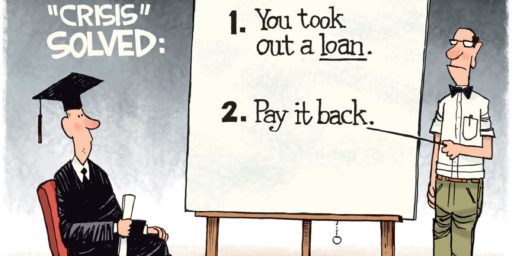Defaulting Homeowners Default Again After Relief
 Roughly three in five people who got bailed after failing to pay back home loans are back in trouble in short order according to a shocking government report. (Well, shocking to government officials. Otherwise, entirely predictable.)
Roughly three in five people who got bailed after failing to pay back home loans are back in trouble in short order according to a shocking government report. (Well, shocking to government officials. Otherwise, entirely predictable.)
Recent data suggests that many borrowers who received help with mortgage modifications earlier this year tended to re-default on their payments, a top U.S. banking regulator said on Monday. “The results, I confess, were somewhat surprising, and not in a good way,” said John Dugan, head of the U.S. Office of the Comptroller of the Currency, in prepared remarks for a U.S. housing forum. “Put simply, it shows that over half of mortgage modifications seemed not to be working after six months,” he said.
[…]
Dugan said recent data showed that after three months, nearly 36 percent of borrowers who received restructured mortgages in the first quarter re-defaulted. The rate of re-default jumped to about 53 percent after six months and 58 percent after eight months, Dugan said, without providing an explanation for the trend.
Explanation? Bad credit risks don’t stop being bad credit risks? That’s lawhawk‘s guess, too.
Can it be that these people should never have been homeowners in the first place? Maybe the problem really is home owners who should not be owning a home in the first place? What happened to income verification?
Bruce McQuain, too: “Sometimes a stiff is just a stiff.”
Tyler Cowen thinks it interesting but provides no conclusions. His commenters, though, provide some useful inputs.
Links via Memeorandum and Google Reader. Photo via taberandrew under Creative Commons license.






Regulators “shocked, shocked” to find more than 1/2 of recently restructured mortgages back in default after 6 mo. http://tinyurl.com/5hsjes
I can see it now…Steve Verdon…steam spewing out of ears.
I think in general yes, a bad credit risk is going to always be a bad credit risk, and handing somebody who doesn’t have any clue how to manage money isn’t going to help them get a clue. As a matter of fact my guess is they will spend with more confidence waiting for the next hand out.
That said-I also am willing to bet that some of the people defaulting on their mortgage due to hardship (job loss, illness etc) likely were in a deep hole that an adjustment in mortgage likely wasn’t going to help because they were already in the quicksand. These kinds of people don’t always start out as bad credit risks and I am willing to bet many of them let other bills slide long before they started to let the mortgage slide.
The funny thing is, “a bad credit risk is always going to be a bad credit risk” is just as applicable to the banks and now big three auto-makers as it is to the home owners.
Stupid is as stupid does…banks, wall street, borrowers, day traders, etc……
Homeowners are like college students -not all of them should be what they are – that’s why they are supposed to have admissions boards and loan officers. I’m certainly glad we have Barney and Chris watching out for us though. This year it looks like the politicians have nationalized Santa…
I was surfing the webs, looking at what was going on with real estate around the country, when I saw a still million-plus house … what’s wrong with this picture … someone took the appliances.
In Tanta’s words, we’re all sub-prime now.
(I own my condo outright, but in this environment I’m probably still sub-prime.)
In other news the sun will rise in the East tomorrow
Bailout…bankers, autoexecs, stupid home buyers.
The rest of us can’t afford the socialism for the rich and stupid…
and on and on it goes…the rich get richer…the middle class pays the freight.
Thanks George, for eight wonderful years of “conservatism”
Oh for God’s sake….
This kind of partisan nonsense is part of the problem. It isn’t just as simple as saying, “That goddamned Shrub!!!”
There is plenty of blame to go all the way around on this one. Stupid incentive programs at financial institutions, as well as stupid policy from the Republicans and the Democrats. Hell, Fannie Mae traces its origins to the 1930s. The idea of making “affordable housing” and the government playing around in the mortgage market…1930s. The first mortgage backed security was issued by Ginnie Mae, a government agency, in the 1970s.
Count on some content-free carpet-chewing from old Steve.
Do you think she called it wrong?
I’m assuming of course that you read the original essay, or at least googled it tonight.
but…but…but… forcing refinancers to actually change their spending habits deprives them of the financial lifestyle that they’ve ‘earned’ the right to have.
I wonder how many people used the ‘gain’ they form refinancing to spend money on Christmas or other discretionary items instead of getting their finances in order.
Then again, given human nature, if restructuring loans actually helps 40% of them get out of a hole it probably should be considered a massive success.
The chain of loan-makers (mortgage broker, bank or S&L, rating agency, CDO broker, bond buyer) all relied on models made in an up-market.
That’s a story thats been told elsewhere, and often reduced to make one part of the chain look more guilty than another … but here’s a bit that plays into the re-defaults: The rating agencies did not have people look at the credit ratings of everyone in a loan bundle. In some cases no “person” looked at all. In the up-market computer-made loans were found to perform as well as human screened ones. They performed as well as that old model where you sat across the desk from a mean old banker.
But of course all that went to hell when the housing market did. The one thing that made bad credit risks into good credit risks was that they could always sell for a profit, close their loan, and presumably trade-up.
I believe that government oversight agencies should have had alarm bells ringing very loud at those AAA ratings on those kind of bonds … well there are some reports that they did, and ignored them. Free markets self-correct and all that ….
So what is this saying, then about the ‘redlining’ charges of years ago that were being directed at the banks? That the banks were right all along, that racism wasn’t the reason they wen’t getting loans, and that a lot of people not paying such loans could cause problems?
Gee.
Bit, if any of those “gov did it” charges had a glimmer of truth, it would have shown up in the bond ratings.
If the mortgage brokers knew, if the bankers knew, if the rating agencies knew, then the mortgages would not have been sold as AAA (the safest) assets.
They would have had no reason to lie, if they wanted to avoid the gov’s road to ruin. Just rate the things as junk, and they would not have sold. There would not have been a sub-prime market, and they would have stayed happy and solvent.
It only worked because banks WANTED that business and lied down the line to get it. Do you remember the rating agency quote: “We rate every deal. It could be structured by cows and we would rate it.”
Unless there was some movement by government there, too. It still boils down to government being the culprit, here, no matter how you slice it.
Do you look for the pebble that starts the avalanche, or do you point to the biggest cause… there’s too much snow?
So show it to me. Show me where The Gov said sub-prime mortgage bonds had to be rated AAA.
Your analysis is embarrassingly bad, odo. Let’s do a quick synopsis:
1. Critics often blame Bush deregulation. Wrong. There has been no material financial services deregulation since 1999. In 1999 President WJ Clinton signed the “Financial Services Modernization Act”……the repeal of Glass – Steagall. Thats it.
2. In 1977 Congress passed the CRA.
After 16 years of relatively innocuous effect, in 1993 HUD officials began bringing legal action against banks to make more loans to minorities – read: take on bad credit risks. So they lowered loan qualification standards.
In 1995 CRA amendments allowed regulators to deny lenders deemed to be in violation of regulator’s views on CRA compliance to deny bank mergers……this in an environment when interstate banking was just allowed. In essence, the regulators could destroy you. More pressure on underwriting standards.
Perhaps most importantly, just as HUD and Congress were pressing Fannie and Freddie to promote “affordable housing” (read: Democratic social engineering) by having them make and purchase these crappy loans – excuse me – “subprime mortgages”…institutional investors realized that there was an implicit government guarantee of them (which has now proved true). Open season.
And Freddie and Frannie grew like wild fire.
3. I note that in 2002 the regulatory body ‘OPHEO” (sp?) wrote a scathing report about the accounting practices of Freddie and Fannie, and the looming debacle. CSPAN tapes of the subsequent 2003 hearings are fascinating. Barney Frank, Maxine Walters….the reps from NY, MS and AL all absolutely scorching the regulators for being everything from scare mongers to racists for even suggesting that the mortgage lending practices were a problem. Now this is looked upon as sad….if not criminal.
4. People like to blame Wall Street greed. But they were simply packaging and selling off the crap loans the Feds forced lenders to make. (Now I admit, once everybody (mortgage brokers etc) learned about the game, they all got in on it and made crap loans, because there was an outlet. Hey! A government sponsored slop at the trough!!!)
But I ask you. You are a bank board member or senior officer. You know the loans are crap. AND YOUR FIRST FIDUCIARY DUTY IS TO THE SHAREHOLDERS – BY LAW – wouldn’t you offload these crap loans??? If you didn’t, you could be sued and ruined. If you do not understand that you are awfully naive.
Bit had it right. Its like a snow avalanche. Blaming the guys who tried to rate this mess is like blaming the park ranger who underestimated the size of the avalanche as it arrived half way down the hill.
Odo, your “analysis” pointing away from government…….I’m feeling generous tonight…….is simply idiotic.